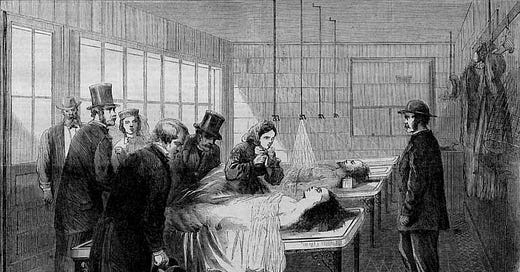History is replete with figures of immense accomplishment, who literally changed the course of human progress, yet are forgotten by subsequent generations. One such figure is Joseph Lister, a British surgeon who practiced in the latter half of the nineteenth century Lister is considered to be the “Father of Modern Surgery” and the “greatest surgical benefactor to mankind,” but who is now perhaps best remembered as the inspiration for the name “Listerine.”
Although doctors had long been aware of germs and theorized that they were the cause of many contagious disease, Lister was the first to recognize the relationship between germs and infections. At the time of his research, infections rendered surgeries so dangerous, and the mortality therefrom was so high, that there was talk of banning internal surgeries entirely because of septic complications. It was due to the risk of infection that limbs were amputated rather than reconstructed.
Lister initially recognized that that something within the wound was causing sepsis, but it was not until he read Louis Pasteur’s research into role of microorganisms in causing fermentation and disease that he linked microorganisms to infection. To create an antiseptic environment, he utilized carbolic acid, which had been used to clean sewers, in order to clean his hands and the instruments that were to be used for surgery. The results were transformative.
Despite evidence that his methods were sound, Lister’s theories were slow to gain acceptance by the medical establishment. The consensus among surgeons was that infections were caused by miasma, or bad air. One surgeon opined that “[t]he whole theory of antisepsis is not only absurd, it is a positive injury.” Another charged that Lister’s “methods would a return to the darkest days of ancient surgery.” The medical journal The Lancet warned the entire medical profession against his ideas. Overcoming fierce initial resistance, it took Lister a decade of successful surgeries to convince doctors in Europe of the soundness of his theory. Most famously, on one patient, he converted a simple fracture of the kneecap into a compound fracture before successfully wiring the kneecap together, a procedure considered extremely dangerous as it threatened the patient’s life due to the risk of infection.
Even then, however, doctors in the United States remained skeptical. At the United States Centennial Exhibition, held in Philadelphia in 1876, Lister lectured a gathering of the country’s preeminent surgeons and physicians at the fair’s Medical Congress. Lister struggled to convince his audience of the importance of preventing infection by destroying germs. Indeed, the president of the Medical Congress wrote: “Little, if any faith, is placed by any enlightened or experienced surgeon on this side of the Atlantic in the so-called carbolic acid treatment of Professor Lister.”
As recounted in Candice Millard’s biography of James Garfield, Destiny of the Republic, the failure to accept Lister’s discovery would have fatal consequences for the United States President. Shot by a deranged assassin, Garfield would likely have survived the attempt on his life had the doctors treating him, including nationally recognized surgeons called in to assist in his treatment, heeded the warnings provided by followers of Lister. Instead, the extensive probing into Garfield’s wounds by unsterilized hands and instruments caused massive infections throughout his body that ultimately proved fatal.
The example of Joseph Lister is particularly relevant given the politicization of medicine today. On September 30, 2022, Governor Gavin Newsome signed a statute that would deem it “unprofessional conduct for a physician and surgeon to disseminate misinformation or disinformation related to COVID-19.” Misinformation is defined by the statute as “false information that is contradicted by contemporary scientific consensus contrary to the standard of care.” Joseph Lister’s germ theory was undoubtedly contradicted by the “contemporary scientific consensus,” in both Europe and the United States, and the medical establishment, if armed with a statute comparable to that just enacted in California, could have deprived the world of a discovery that inarguably changed the course of human history and saved millions of lives. Joseph Lister would not be remembered as a giant of the medical profession, but would have died in ignominy and obscurity.
One need not look back to the time when medicine entertained the use of leeches and bloodletting to recognize that doctors’ understanding of medicine is not static, but is constantly evolving. It is the very act of questioning “medical consensus” that has spurred this evolution. While the California legislation in question is limited to information related to COVID-19, it establishes a principle that the medical establishment can use the power of the state to squelch innovation and inquiry that runs contrary to the “consensus” that the establishment promotes. Such a principle would likely prove to be more dangerous, and result in many more deaths, than any so-called “misinformation” that the law purports to combat.





There's a very good book on this subject called 'The Century of the Surgeon'. Jurgen Thorvald, 1957. It addresses two major developments in 19th century surgery, sterile procedure and the use of anesthesia. Any bookworm who appreciates this article should enjoy it. I've read it twice, once about 50+ years ago again this year.
Also reminds me of the sad story of the Hungarian doctor who promoted the idea of doctors washing hands before delivering babies. He published a book with data, but was mocked. Died in an insane asylum after being beaten by guards and getting gangrene. Science driven by flawed people may take some wrong turns. Personalities and egos are elements in real world progress and diversions. https://en.m.wikipedia.org/wiki/Ignaz_Semmelweis